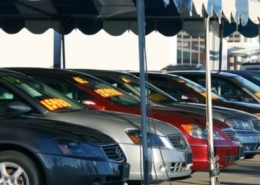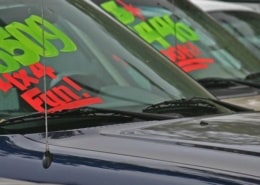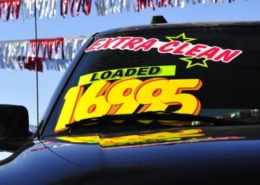Should I Buy a Rental Car?
Is Buying a Rental Car a Good Investment?
Over the past few months, many readers have asked if it’s a good idea if they should buy a rental car. Before answering this question, let’s look at the rental car business as a whole.
The major car rental companies buy some two million cars each year. Those cars don’t just magically disappear after 18 to 24 months. They get sold, either at large auctions or directly to the public. That means roughly one in five cars on the road is either a rental or an ex-rental. You could be sitting in one right now and not even know it!
Is Buying a Rental Car Right for You?
There are two schools of thought when buying a rental car. One says it’s a great way to get a good deal. The other says to avoid them at all costs. So which is correct?
Unfortunately, there’s no simple answer, so here we’ll take you through the pros and cons of buying a rental car. We’ll also explain the processes the major companies follow when selling their used vehicles and offer some advice on how to buy a used car wisely.
After reading this article, you should know enough to decide if buying a rental car is the right decision for you. (Or maybe that should be purchasing an ex-rental car.)
About the Rental Car Business
Although a Google search will undoubtedly turn up a slew of rental firms in the area, the automobile rental industry is dominated by three large competitors. These are Enterprise (which owns Alamo and National,) Hertz (includes Dollar and Thrifty,) and Avis (Budget, Payless, and ZipCar.)
These companies’ buying power lets them negotiate great deals from the vehicle manufacturers, providing the manufacturers want to play that game. Some choose not to. Rental cars are also known as “program cars” since they are returned to the manufacturer after the rental firm has used them. Others get sold to wholesalers, and a small proportion of the companies sell themselves.
Rental cars tend to get driven a lot. (If a vehicle isn’t on the road, it’s not earning money for the rental company.) Rental cars used to be maintained on the road by rental companies for 12-14 months and 25-35,000 miles. In recent years, though, as vehicles have become more reliable, the rental companies have tended to keep them longer. Today it’s not uncommon to get a rental that’s 18 – 24 months old with up to 40,000 miles “on the clock.”
5 Good Reasons to Buy a Rental Car
Let’s start by running through the reasons you might want to buy a car from Enterprise or one of the other companies.
1) Low(ish) Prices
Rental companies buy their cars cheap, so they can also afford to sell them cheap. They’re not fools, though; you’ll find they know the market value. As a result, their cars will be discounted somewhat but perhaps not as much as you might expect. It’s up to you to do some due diligence.
2) Nearly New
Rental automobiles, as previously stated, are typically sold after 24 months (occasionally less) or 40,000 miles, whichever comes first. That means you’re looking at late-model vehicles with all their associated benefits. ( Primarily Safety and fuel economy.)
3) Warranty Coverage
Since almost every new car comes with at least a three-year/36,000-mile warranty, your ex-rental may have a year or more remaining factory coverage. In addition, the “Big 3” includes a warranty of 12 months/12,000 miles on most, if not all, of the cars they sell.
4) Easy Purchasing Process
Enterprise, Hertz, and Avis all advertise “no haggle” purchasing. That means you pay the price they’re asking or walk away. However, as the price is probably nearer than that asked by private sellers than dealers, you’re getting a reasonable deal. In addition, you can do most of the buying process online, making it a fast and easy process.
Other noteworthy points are their flexibility regarding test drives, returns/exchanges, and trade-ins. All will let you drive the car you’re considering and exchange it if you’re unhappy with it, but Hertz also offers a “Rent2Buy” program. Effectively an extended test drive lets you try the car for an extended period before committing to it.
5) Maintained and Certified
Rental companies look after the rentals because they don’t want them breaking down on their customers. Plus, they know it helps the resale value. So if you buy a rental car, you can be sure it’s had regular oil changes and all the scheduled services. They’ll also ensure any recalls are quickly handled, which isn’t often the case with private sellers.
Many of their used rental cars sell as “Certified.” The vehicle has been adequately inspected, and any serious flaws have been repaired, just as at a car dealership. (You should note, though, that Hertz also sells non-certified cars. If being certified is essential to you, check this point applies to the vehicle you’re interested in.)
Six Arguments Against Buying a Rental Car
Here are the reasons most commonly presented for avoiding a rental.
1) They Lead a Hard Life
You’ll sometimes hear that rental cars are “abused.” While some drivers may not take good care of a car, they’re renting. It’s hard to see that many would deliberately abuse the vehicle. Mostly they want to get from A to B while avoiding any need for insurance claims.
More likely than outright mistreatment is that a rental car will see a broader range of driving styles than one privately owned. This might increase the amount of wear and tear on the vehicle, but keep in mind that it will be well-maintained.
2) High Mileage
Rental cars have to work, so they’ll almost certainly have done above-average mileages. The price should, however, reflect this. (As we’ve noted in other articles, high mileage isn’t necessarily bad.)
3) Limited Availability of Some Brands
The rental companies buy cars they can get at reasonable prices. You’ll see they have lots of Fords, Chevys, Dodges, Nissans, and Hyundais but very few Hondas, BMWs, or Audis. If you’re hoping to snag a deeply discounted prestige automobile, you may be out of luck.
4) Limited Range of Options and Equipment
Rental companies seldom load up their vehicles with expensive options. Don’t expect sunroofs, high-end audio systems, or the most sophisticated active safety equipment. Some don’t even get what most buyers would consider essentials like floor mats.
5) Impact on Resale Value
The car you buy today is the one you’ll want to sell tomorrow. The next buyer will probably expect the same if you get it at a discount because it was a rental. And don’t think you can hide that fact: it’s best to assume information about previous owners will be available.
6) Stigma of Buying a Rental Vehicle
Despite the maintenance lavished on rentals, there is still a stigma attached to them. Tell your neighbor that your beautiful, new to you car was a rental, and he may suggest you’ve been foolish. It is up to you whether you choose to disclose its prior history and whether you care what your neighbor thinks is.
The Process for Buying a Rental Car
The “Big 3” have gone to great lengths to make it easy, but that doesn’t mean you’re guaranteed a bargain. Here’s some advice from AutoCheatSheet.
How to Buy a Rental Car
- Browse the big three rental company websites’ dedicated sales websites nearby: (Enterprise car sales, Hertz car sales, Avis cars ales.) Take notes on the used rental vehicle/vehicles you’re interested in buying. Keep in mind that these sites’ prices are usually one, take-it-or-leave.
- Compare the prices with free used car price quotes from other websites where you can find newer used cars, such as Ryde Shopper, Edmunds, Motor Trend, and Cars Direct. Make sure you compare apples to apples, as mileage and trim levels can significantly impact the asking price. It’s even better to check both dealer retail and private seller prices.
- You can often use the no-haggle price you see on the rental company’s website to negotiate a much better deal through a traditional dealership on a vehicle that may have fewer miles or more equipment. The reason for this is dealers can be more flexible on pricing as rental car companies have to follow a particular “pricing model” before they can sell the used rental vehicle to the public.
- When you’ve found a car you like at the right price, check the vehicle’s title history report to ensure the car hasn’t been in an accident or flood. (Some rental companies and dealerships may provide this for you.) I always recommend spending the additional money and getting your history report. Doing this will keep unethical dealers from providing you with false information. If everything looks good, it’s time to visit the sales location to inspect the vehicle yourself.
- If the vehicle looks good and you’re still interested, take the car for a nice long test drive as you would with any other vehicle.
- Are you still interested? Then get an independent inspection from a third-party certified mechanic (it’s worth the additional money).
- Finally, once you’ve done your due diligence, you’re ready to move forward on purchasing your “new-to-you” car.
If you are trading a vehicle, the usual advice applies: sell it yourself if you can. Hertz does say they have a trade-in process, and it’s unclear if Enterprise and Avis will do the same.
All three companies will arrange auto financing if you need it, but the same caveats apply when financing through a dealership: assume they make money on it.
Arm yourself with a pre-approved auto loan before financing with a dealership. For the lowest rates available, check out reputable online auto loan lenders.
You can get a free, no-obligation quote from online lending services such as MyAutoloan and Auto Credit Express. When meeting with the finance department, you can leverage these quotes to leverage your position. Go with them if they can beat the interest rate and save you money. If not, go with your pre-approved auto financing already in place.
Make an Informed Decision Before Buying a Rental Car
Rental cars have a poor reputation, but does that make them a bad buy? A simple answer is not necessarily. As with buying a used car anywhere else, it’s up to you to do your due diligence to ensure you’re getting a good deal.
You will almost certainly find that the process is more accessible than working with a used car dealer. That, combined with the low(ish) prices, make a used rental car attractive for some buyers. The choice is yours, but don’t forget that AutoCheatSheet is here to help.
As we noted several times, the most important thing for you to do before buying a rental car is to do your research before walking into a dealer’s showroom. You want to know what car you want and what you’re willing to pay.
Dealerships, in general, are designed to separate you with your money, don’t think rental company dealerships are any different. Being prepared and doing your research will level the playing field with these car sales professionals, significantly increasing your chances of receiving the best deal possible.
It’s also essential to understand the entire car buying process. That’s why this website exists, so please take full advantage of the information we provide.
The number one tip for saving the most money when buying a new or used car is always to take your time and “DO YOUR RESEARCH FIRST!”
As always, I recommend using an online referral service such as Ryde Shopper, Edmunds, Cars Direct, and Motor Trend before walking into a car dealership. Their free online price quotes will automatically help level the playing field with the dealer and let you know right away which dealers are willing to be more flexible on price. Please consider them the next time you buy a used car online. They will save you a lot of money.













